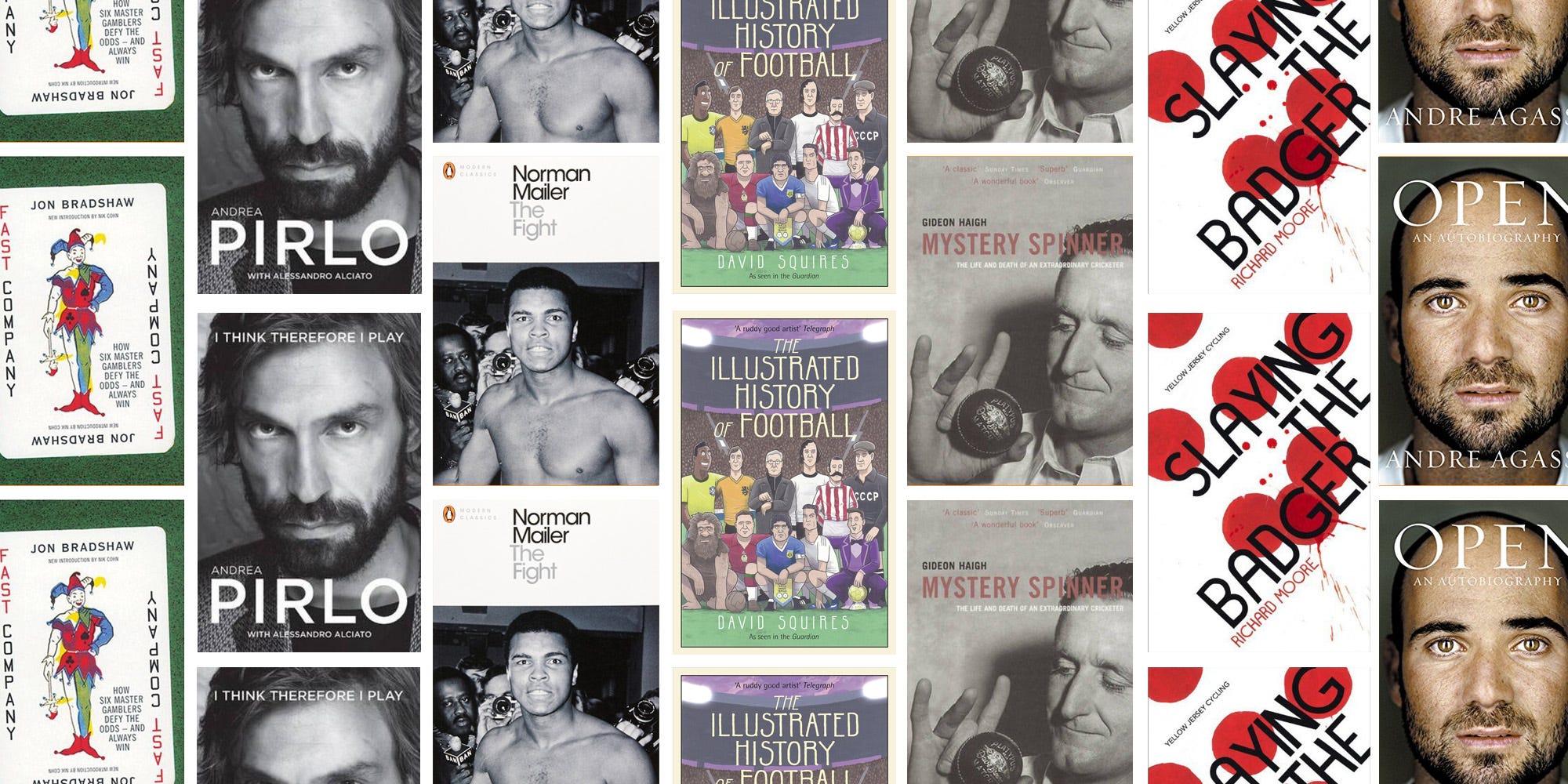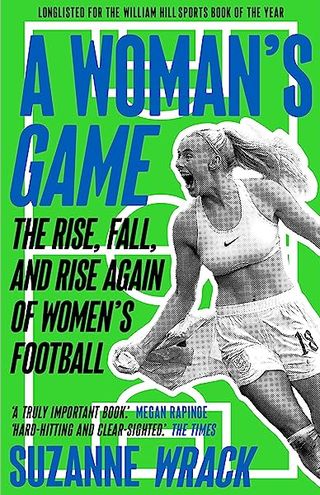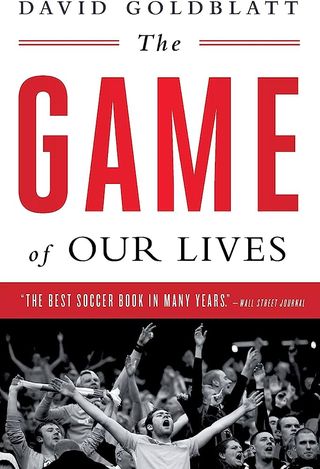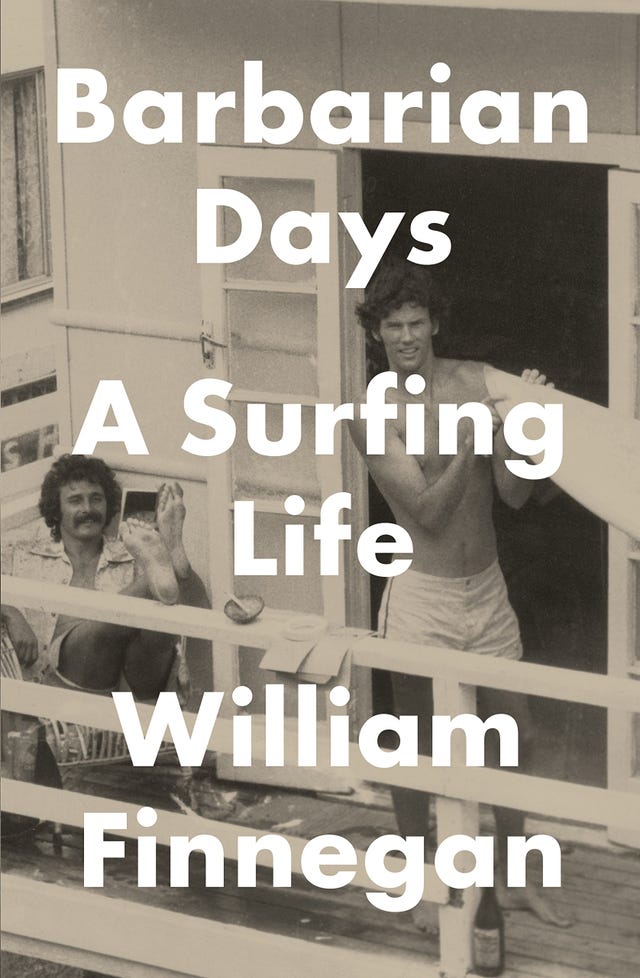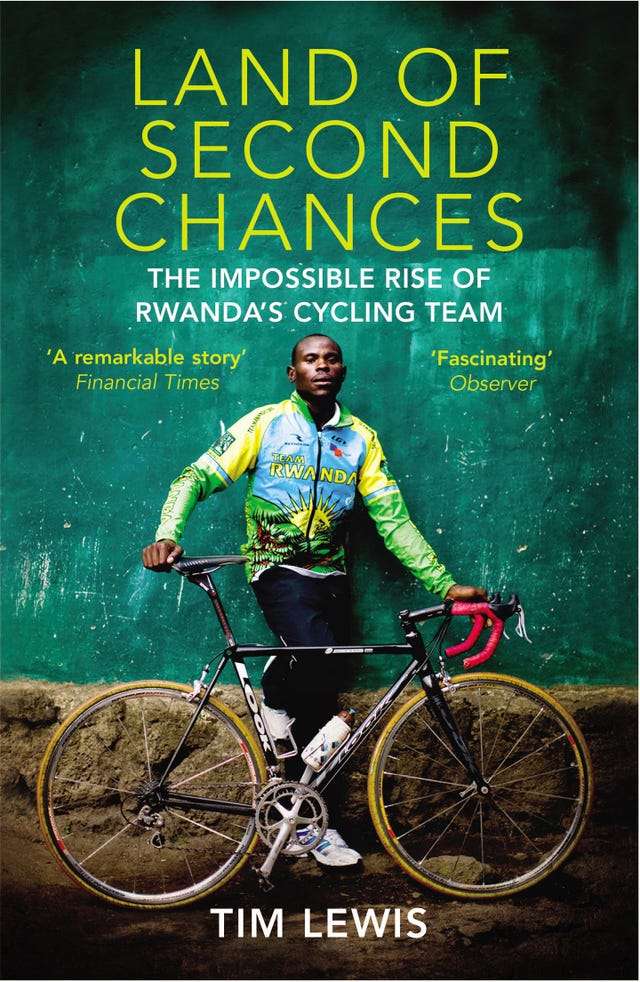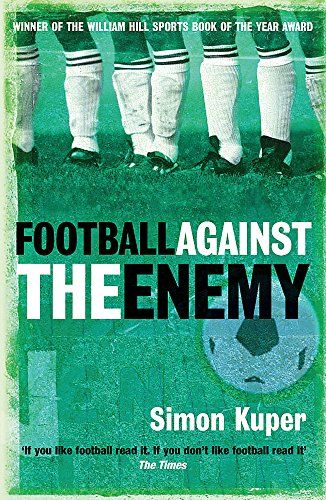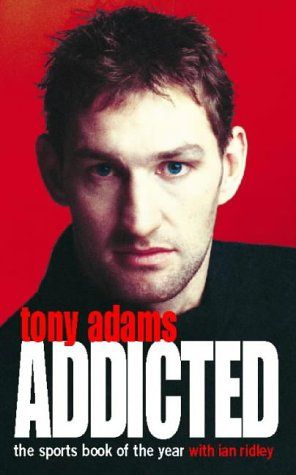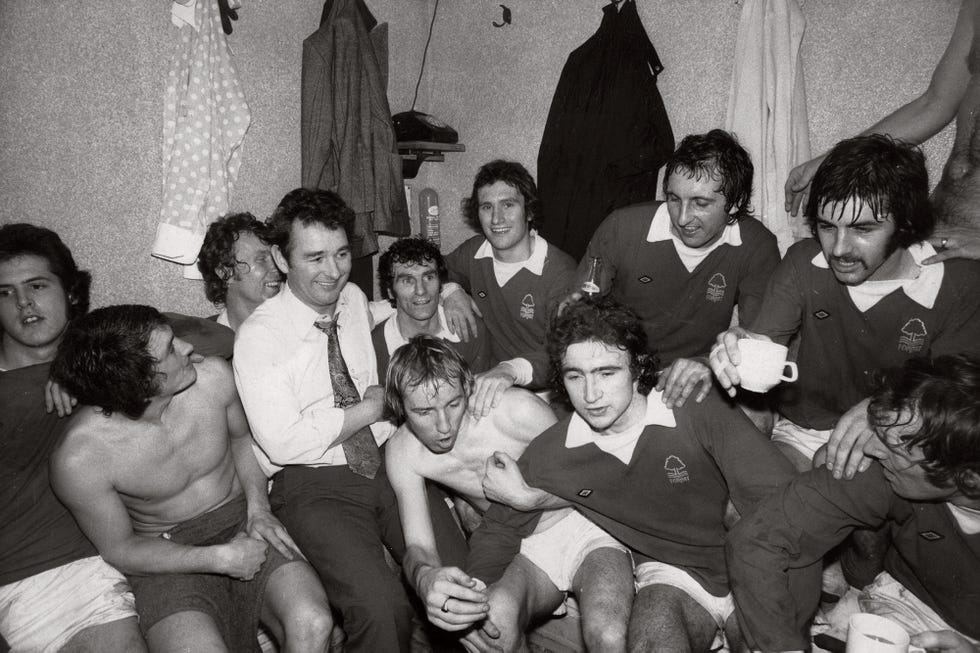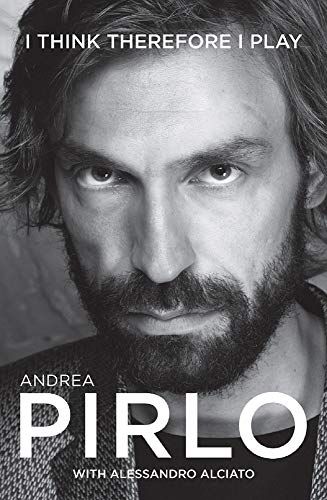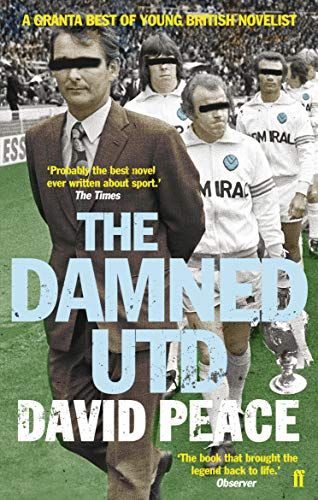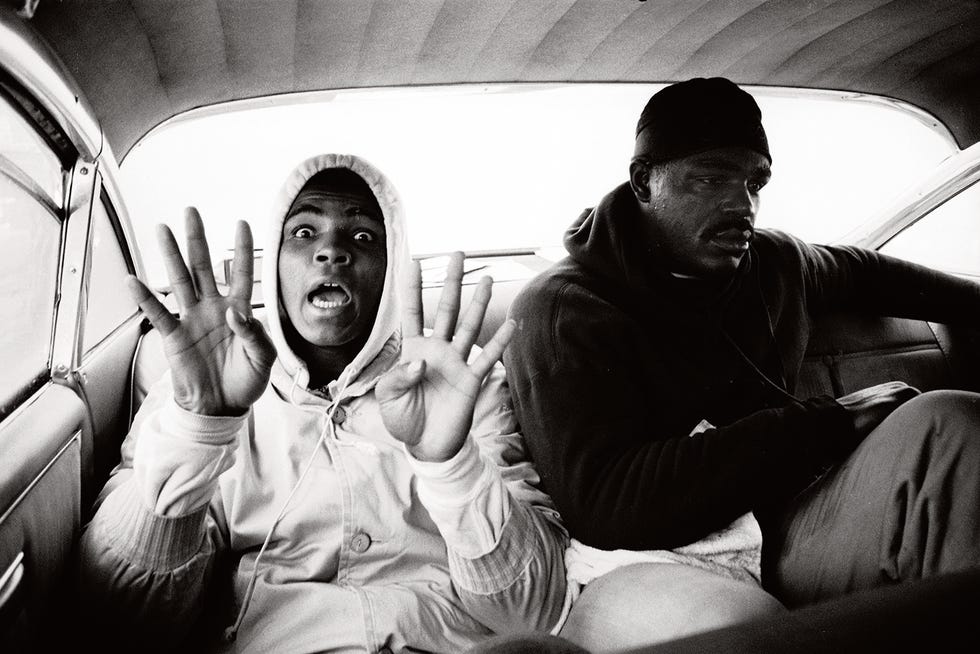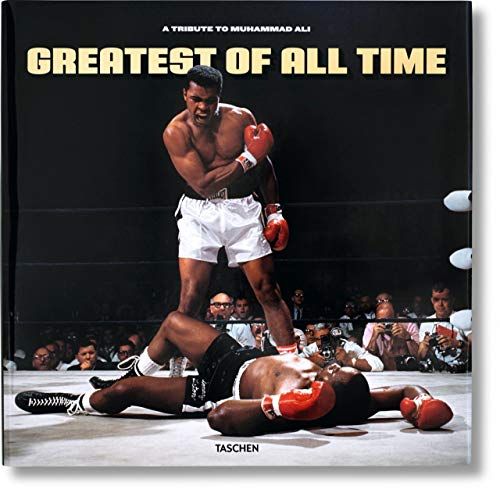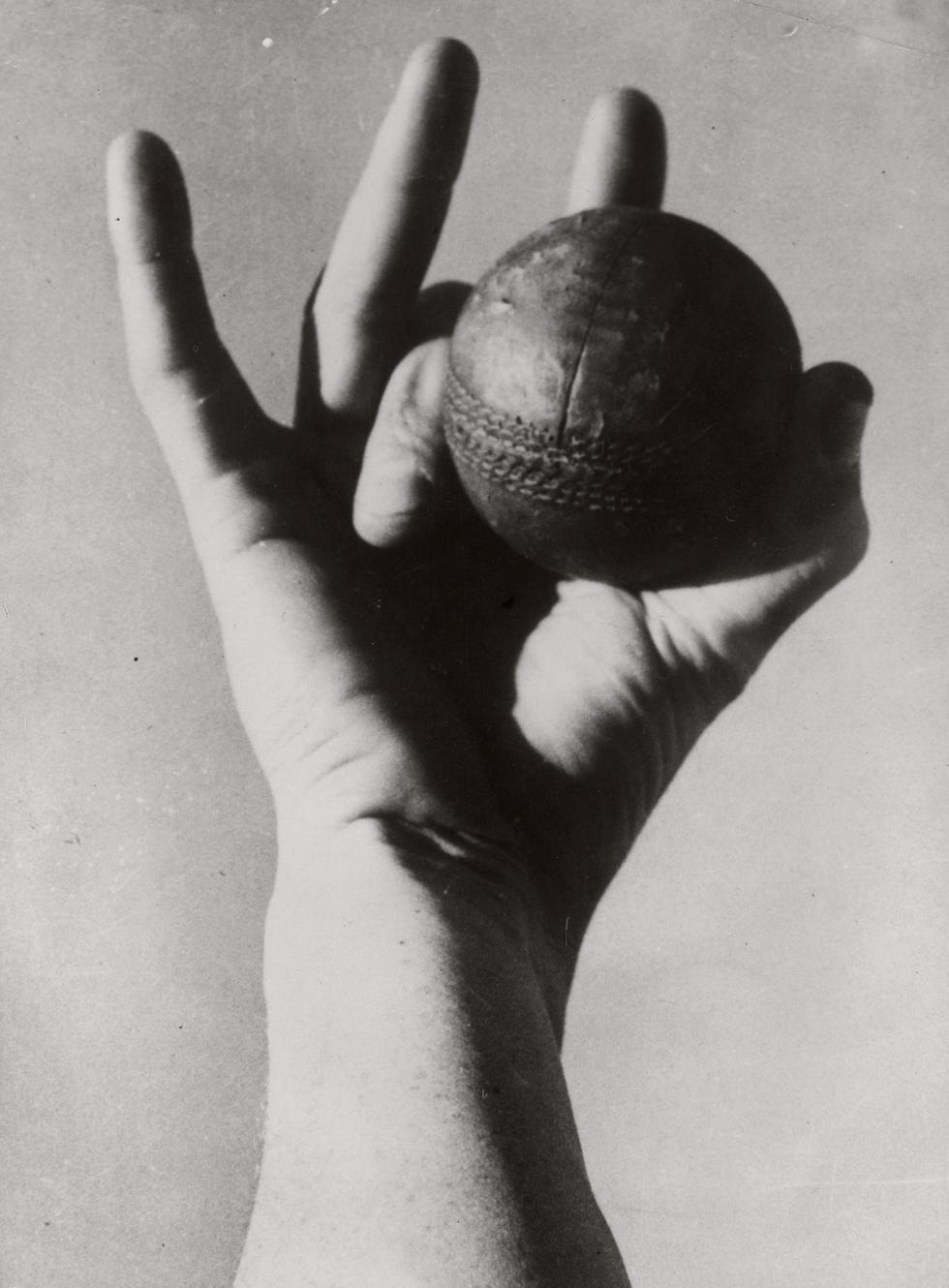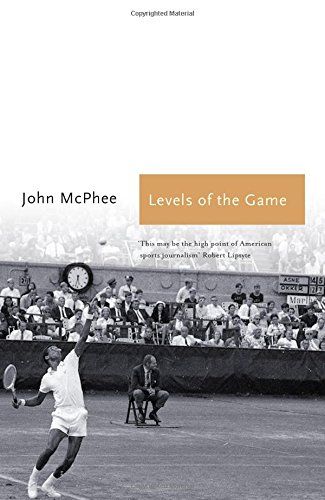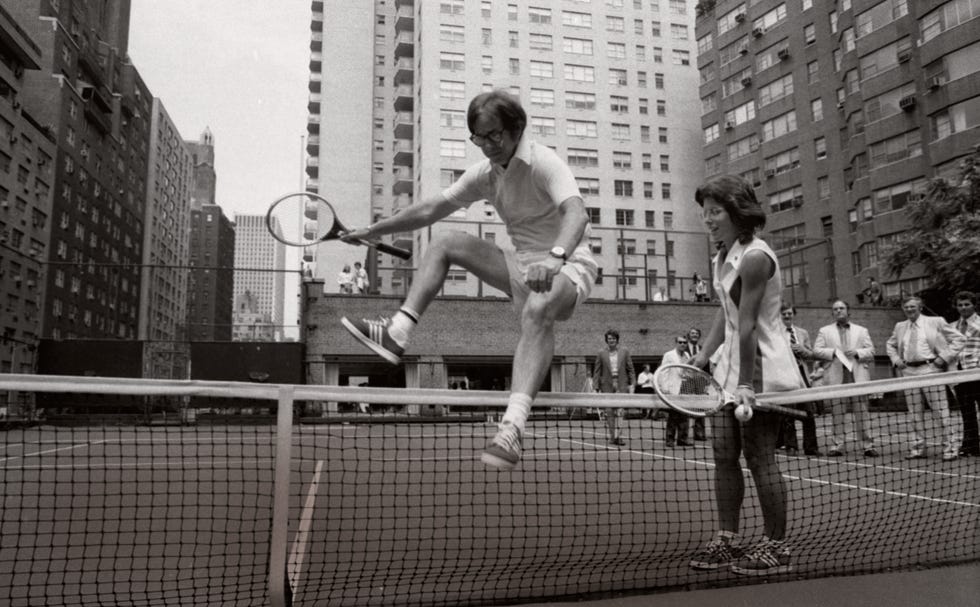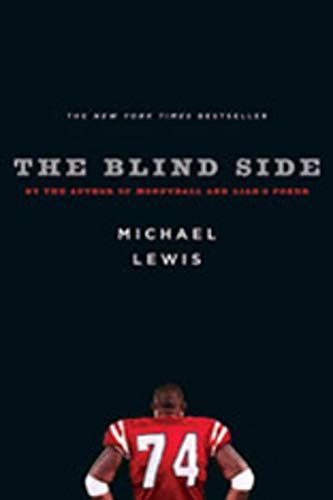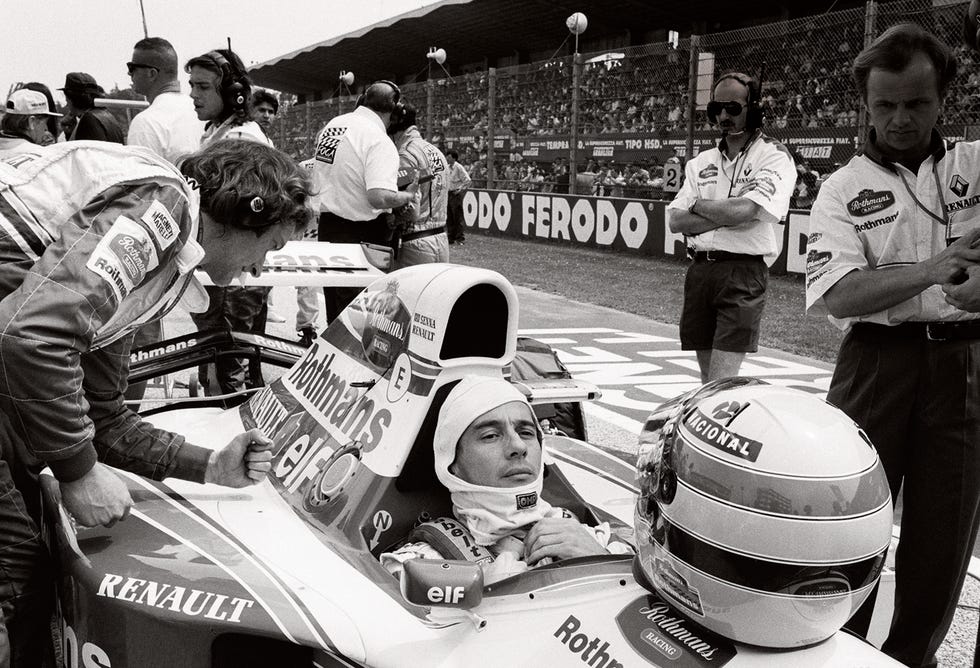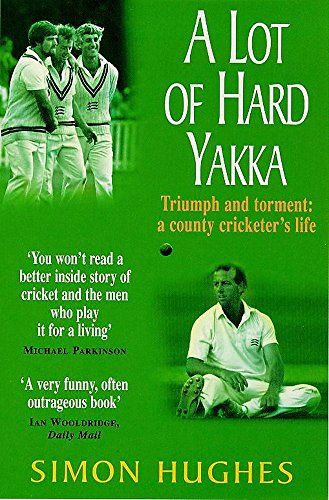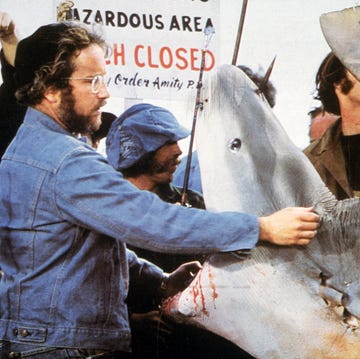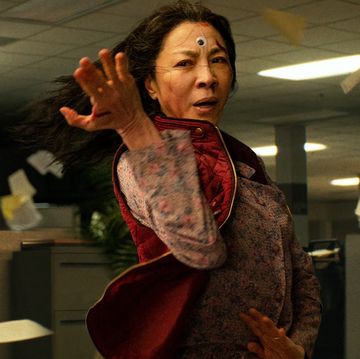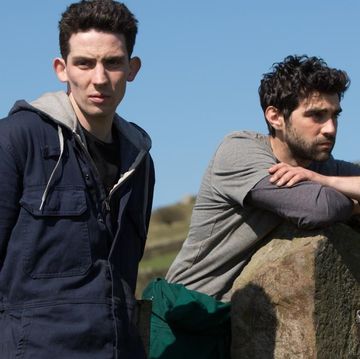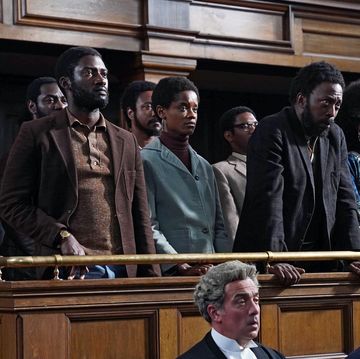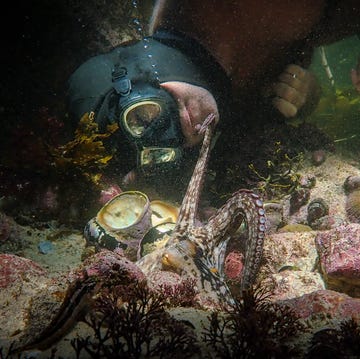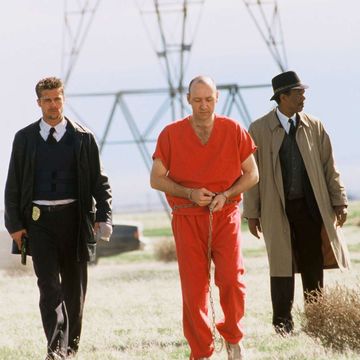We’re not the first to observe that the thing about sport is that it comes with a built-in narrative arc. There will be heroes and there will be villains. There will be triumphs and there will be disappointments. There will be winners and there will be losers (unless it’s a sport like football which, to Ted Lasso’s continuing befuddlement, allows for a “tie”). But what happens off the pitch, or outside the field, or court-side, can often be as dramatic – if not more so – than what happens on, as it takes a certain type of person to excel at sport: gifted, driven, and sometimes, yes, a little psychotic.
Documentary-makers have found a rich seam to exploit in retelling sports narratives recently, and looking at some of the more exceptional characters who’ve risen to the fore (The Last Dance being the most high-profile example, although there has been a raft of other good ones), but nothing can delve into the intricacies of a great athlete’s mind like a book, especially in the hands of a great writer. Here we’ve recommended some of our favourites of this century and the last, that will keep you gripped to the final whistle.
A Woman's Game: The Rise, Fall and Rise Again of Women's Football by Suzy Wrack (2022)
Timed to land just as the Lionesses started their tilt at winning the Euros and immortality, the Guardian's Suzy Wrack traces women's football from the mid-Great War, post-Suffragette days when huge crowds would flock to see women's teams – Dick, Kerr's Ladies drew 53,000 to Goodison Park on Boxing Day 1920 – to a backlash that saw women banned from playing on FA pitches between 1921 and 1971 on the grounds that football was "unsuitable for females". Then, the slow climb back to prominence, and a big decision to make: does women's football try to 'catch up' with the global reach of the men's game, or make the most of what makes it different and joyful? This is a thorough run through a backstory which rarely used to make the back pages.
The Game of Our Lives: The Meaning and Making of English Football by David Goldblatt (2014)
In the men's game, however, things have rarely been more weird. At the time of writing, Manchester United may still be bought out by former Qatari Prime Minister Sheikh Jassim, and the season has stretched into late June thanks to a mid-winter World Cup. How did we get here? Goldblatt shows how English football as we know it was liquidated and reformed as an entertainment product to beat them all in the wake of the Thatcher years, knitting it together with the ways England itself has changed in the 21st century. A lot has changed in the last decade – Chelsea cop a lot of flak, despite the ownership now looking positively quaint next to Manchester City and Newcastle United – but to understand how we got here, start with this.
Barbarian Days: A Surfing Life by William Finnegan (2015)
Finnegan’s Pulitzer-Prize-winning memoir about his lifelong obsession with surfing – starting in California as kid, then Hawaii as a teen, taking him right though to New York in the present (a lesser-known surf spot, certainly) – is a searing and startling paean to the sport. Yes it can seem pointless, and yes it can be punishing, but Finnegan is able to encapsulate the feeling of freedom and euphoria like few others, while also describing his own meandering personal history, which somehow transformed him from a twentysomething stoner surf-bum into a renowned political journalist for the New Yorker, particularly for his reporting from Apartheid-era South Africa.
Blood Horses: Notes of a Sportswriter’s Son by John Jeremiah Sullivan (2004)
Like so many of the titles on this list, John Jeremiah Sullivan’s first book – printed in the UK for the first time in 2013 after the success of his brilliant 2012 essay collection, Pulphead – is a sports book but also something more. It began as a consideration of the life of his late father, Mike Sullivan, who had been a sportswriter for a Kentucky newspaper, and whose fascination with sport in general, and with horse racing in particular, his son had never quite managed to understand. In telling the story of the legendary racehorse Secretariat, one of whose Kentucky derby wins his father attended, he unpicks a sport that is both fascinating and mystifying in equal measure.
Land of Second Chances: The Impossible Rise of Rwanda’s Cycling Team by Tim Lewis (2013)
If sport can be accused of providing neat story arcs (see intro!), or clear-cut heroes and villains, Lewis’s British Sports Book Award-winning exploration of the attempt – by a group of American former professional cyclists – to set up a cycling team in Rwanda a decade after the genocide there in which 1 million people were slaughtered, is as nuanced and fascinating as they come. Lewis, a contributing editor to Esquire, spent time in Rwanda with the would-be riders, including the talented Adrien Niyonshuti, who lost six brothers in the 1994 genocide, and also the professionals who helicopter in to set up the country’s first team, but who, in the case of coach Jock Boyer, turns out to have a dark past of his own.
Football Against The Enemy by Simon Kuper (1994)
Financial Times columnist Simon Kuper wrote this accomplished and quirky footballing travelogue when he was still only in his early 20s. And it's remarkably good; arguably the first and even best in the now-not-so-new wave of 'literary' football tomes that have followed in ever-greater numbers. Kuper travels to 22 countries to find out how football has shaped individual national politics and culture – and vice versa – meeting players, politicians and picking up anecdotes and observations along the way. We all know football as a global obsession, but these fascinating tales – from the tragic to the bizarre – show just how far its reach extends.
Touching The Void by Joe Simpson (1988)
Simpson's harrowing account of his and Simon Yates's calamitous assault, in 1985, on Siula Grande, Peru, has rightly transcended the sport of climbing and become a legendary fable for what humans are capable of doing to survive. It centres, of course, on one of the most amazing escapes ever achieved: with Simpson hopelessly hanging off one end of a rope, Yates is faced with cutting it to prevent them both being killed. Somehow, Simpson survives the fall. But alone in a crevasse with a shattered leg, his situation is hopeless. What follows is a staggering tale of will and courage that also addresses the perennial question of what drives people to climb mountains in the first place. As Churchill said: "When you're going through hell, keep going".
A Good Walk Spoiled: Days And Nights On The PGA Tour by John Feinstein (1995)
Even if you're not a golf fan – though it certainly helps if you are – this groundbreaking account of the highs and lows of the 1993/4 season on the American pro circuit is ultimately a human drama. With unprecedented access to the stars – Greg Norman, Nick Price, John Daly and Nick Faldo to name just a few – and rookies alike, it reveals the disparate personalities and personal travails behind the TV images and how these combine with the particular demands of a sport where the margins between success and failure are so thin. A gripping and always entertaining account of what can justifiably be called the cruellest sport of all, whatever your level.
Addicted by Tony Adams (1998)
Adams was still a regular for Arsenal and England when his jaw-droppingly frank autobiography was published at the start of the 1998–99 season. His drinking problem destroyed him personally yet seemed to leave his football unaffected (wearing bin bags under training kit to sweat out the booze served him well). If any stories were left out, they must have been truly hideous. Here are remembrances of picking through jeans on the bedroom floor to find the least-piss-soaked pair to wear. Expect fights, prostitutes, broken lives, redemption.
Paper Lion by George Plimpton (1966)
To millennial sportswriters who never leave the office (or sofa) to live blog sport on TV, Plimpton’s participatory journalism (“that ugly descriptive”, in his words) must seem preposterous and grand. That Plimpton himself came across ever so slightly preposterous and grand was not lost on the man himself, who pricked that public persona with a terrifically witty, inquisitive writing style that worked best applied to sport. Of his five books about taking part in pro-level match-ups in boxing, baseball, ice hockey, golf and US football, Paper Lion, on the latter, is the finest.
Pocket Money by Gordon Burn (1986)
Burn, known for his mixing of fiction with non-fiction in the New Journalism style, spent a year documenting snooker during its mid-Eighties’ boom, and produced one of the lesser-known classics of British sportswriting. Reading it now, Burn is not the Hunter S of the green baize: his write-up is as straight as Steve Davis’s cue action, yet all the better for it. Every endorsement deal, every shit hotel room from Stoke to Guangzhou, every hour on the practice table, every string pulled by the promoter Barry Hearn: Burn recorded the lot with great skill.
Provided You Don't Kiss Me: 20 Years With Brian Clough by Duncan Hamilton (2007)
“A spurious intimacy evolves between you,” writes Hamilton, of the relationship between a football club reporter and the club’s manager. In his case, from the age of 18 for two decades in Nottingham, with Clough, “an extraordinary journey with a contradictory, Chinese box of a man — idiosyncratic, eccentric, wholly unpredictable.” Clough’s one-liners are magnificent, for example, on a time before blanket player representation: “the only agent back then was 007 — and he shagged women, not entire football clubs.” Hamilton’s poignant, revealing book is a wonder.
I Think Therefore I Play by Andrea Pirlo (2013)
I Am Zlatan is held up as the foreign footballer’s must-read memoir, but entertaining though the Swede’s book is, time spent rubbing up against his ego isn’t so enlightening. Pirlo’s, however, has the sort of insight you’d expect from the thinking man’s Greatest Player of his Generation. "You won’t believe me, but it was right in that very moment," about to take the first penalty in the 2006 World Cup Final shoot-out, "I understood what a great thing it is to be Italian. It’s a truly priceless privilege." Also learned: he adores video-game football and always plays as Barça.
Laughing in the Hills by Bill Barich (1980)
As mid-life crises go, Barich’s, aged 35, is special. Five rejected novels, mother and mother-in-law dead of cancer five weeks apart, no money, no job, wife with suspected brain tumour. Craving structure, he found it only studying the Daily Racing Form, picking horses methodically and placing small bets. He then told his wife (tumour: false alarm), he’d be moving to a motel next to San Francisco’s Golden Gate Fields racetrack, “convinced there was something special about racing and I wanted to get to the heart of the matter.” There was. He did. His write-up of that time is spectacularly good.
Ball Four by Jim Bouton (1970)
On the face of it, a diary of the 1969 season by a second-string pitcher for the Seattle Pilots baseball team, the only year that team existed, does not leap to the top of the to-read pile. But the total frankness in terms of locker-room talk, player drug use and womanising, bad blood, gamesmanship and other off-topic matters means this is the most inside-a-team book you’ll ever read. It offended baseball so much, Bouton’s 1971 follow-up was called I’m Glad You Didn’t Take It Personally. David Simon, creator of The Wire, put Ball Four in his six all-time favourite books.
The Damned United by David Peace (2006)
Brian Clough (see elsewhere on this list) spent 44 days as manager of Leeds United in 1974. Peace’s self-styled “fiction, based on a fact” unpacks this mistake via an unrelenting Clough inner monologue that brings the great man vividly to life. (The Clough family, and Leeds’ Johnny Giles disagreed, the latter winning an apology though the courts.) As a study of football partisanship, one of the game’s most important emotions, it is astonishing. Said Gordon Burn (see elsewhere on the list), “if the English novel needs a kick up the pants... consider it wholeheartedly kicked.”
Muhammad Ali by various
The Greatest has a whole shelf to himself in the sporting library (including, naturally, The Greatest Coloring Book of All Time). Four books in particular stand out, together covering every angle you could wish for. Jonathan Eig’s Ali: a Life (2017) is the best cradle-to-grave account, as good on the flaws as the fabulous. King of the World: Muhammad Ali and the Rise of an American Hero (1999) by David Remnick focuses on the Clay-becomes-Ali era of the early Sixties. The Fight (1975) is Norman Mailer’s amazing retelling of the Rumble in the Jungle, and the giant, glossy Greatest of all Time (2003; 2010 reprint) by Taschen, is the coffee table book to top them all.
Slaying the Badger: LeMond, Hinault and the Greatest Ever Tour de France by Richard Moore (2011)
The badger, or more correctly, Le Blaireau, is Bernard Hinault, the last Frenchman to win the Tour de France and one of cycling’s all-time greats. Out to get him is his American teammate Greg LeMond, who finished second to Hinault in the 1985 Tour and wants the result reversed in 1986’s race. Reliving the latter contest, Moore forces the reader to pick sides — grizzled veteran versus young upstart, old ways versus new ways, USA versus France — which only heightens the drama. Journo props to Esquire contributor Moore, too, for tracking down both men more than 25 years later for illuminating postscripts.
Open by Andre Agassi (2009)
According to The New York Times: "one of the most passionately anti-sports books ever written by a superstar athlete." Says Agassi: "I knew in the book I had to expose everything." So: the unceasing slog, from toddler to champ, that prevented him from loving tennis, or anything, until he met his second wife Steffi Graf. His failed first marriage to Brooke Shields, crystal meth: it’s all here. Props to Agassi and his quest for truth, and also his ghost, JR Moehringer, who got 250 hours of interview time with his subject instead of the typical 30.
All Played Out by Pete Davies (1990)
English football’s second-finest hour — Italia ’90 — led to its finest book. Having spent the year before the World Cup earning the trust of the England players and manager Bobby Robson, Davies was let into the camp during the tournament. He also observed, close-up, the press, fans and hooligans. An epic journey for the team and their chronicler, superbly told with sharp reportage, dry humour and real feeling. In 2010, the book was retitled One Night in Turin, to tie in with the documentary of the same name.
Chinaman by Shehan Karunatilaka (2011)
First, to get ahead of any Twitterstorm, we recognise the decision of cricket bible Wisden (the greatest annual sports book ever, of course) to stop using the term “chinaman” to describe a slow left-arm wrist-spin bowler. Such a player is one of cricket’s rare gems, and this novel is about a washed-up journalist trying to find a slow left-arm wrist-spinner who has faded from the spotlight. The author knows a lot about cricket, but he also knows a lot about myth, mystery, obsession, drinking and noble pursuits undertaken by the ignoble.
Mystery Spinner: the Story of Jack Iverson by Gideon Haigh (2002)
Hold your right hand out in front of you, palm facing you, fingers spread, then bend your middle finger at the knuckle. Now try bowling a cricket ball held between thumb and middle finger. Jack Iverson mastered it, and bamboozled batsmen so much that when he played for Australia, the captain, also Iverson’s club captain, would move players from other clubs around in the field so they couldn’t watch Iverson up close. This biography, by the writer many think is cricket’s current best (they’re correct), reveals, at times movingly, why Iverson didn't become an all-timer.
Fever Pitch by Nick Hornby (1992)
Hornby could not have imagined that his book would be relevant to the football fan’s experience 26 years after it was first published. (That it is still in print, after several bestselling years, would also be a surprise to him.) It’s harder for fans to follow Hornby’s best piece of advice — be seen reading the papers’ back pages on the first days of a new job, to attract fellow supporters — but he absolutely nails the inexorable pull of football fandom. And he had to do it all with boring, boring Arsenal.
Levels of the Game by John McPhee (1969)
This writers’ favourite began life, as most of its author’s books do, as an article in The New Yorker. It is an account of the 1968 US Open semi-final between Arthur Ashe and Clark Graebner, a profile of both men and their place in US society at the time. Ashe is black, Democrat, bookish, skinny; Graebner the opposite. Every sportswriter ever has played the sport-is-life-and-life-is-sport card. In this slim volume, which punches far beyond its weight, McPhee plays it best of all.
The Miracle of Castel Di Sangro by Joe McGinniss (1999)
Castel Di Sangro is a small-time football club that miraculously rose through the Italian pyramid to Serie B’s second tier for the 1996–97 season. Equally extraordinary was the presence of McGinniss, a US writer famous for a revealing Richard Nixon book and true-crime doorsteps, as the upstarts’ Boswell. He had fallen hard for soccer after the 1994 World Cup and moved to Italy to document the fairy tale. Instead: corruption, cocaine smuggling, car crashes and conspiracy to go with the calcio.
Fast Company by Jon Bradshaw (1975)
Brilliant, evocative profiles of winning gamblers including Bobby Riggs (of the 1973 'Battle of the Sexes' tennis match), pool legend Minnesota Fats and Tim Holland, backgammon’s best ever. The author, who wrote for Esquire, New York magazine and Vogue, understood these rascals because he admired and shared their qualities. In his introduction to a later edition, writer Nik Cohn remembers Bradshaw’s "conscious roguery, a Rothmans perpetually dangling from one corner of his mouth, and that lopsided shark’s grin plastering the other. He sported Turnbull & Asser silk shirts and Gucci loafers, flashed gold lighters and a Piaget watch." Touché.
Beware of the Dog by Brian Moore (2010)
England’s 64-cap hooker begins this second account of his life by effectively apologising for the less-than-candid nature of the first, then describing the sexual abuse he endured as a child, why he came to deal with it as an adult and what happened when he told his mum. It’s genuinely stunning. But this book is not on this list because of just one chapter. Everything that follows, including pissed-up rugby tales, personal and professional highs and lows, feels like it’s in the book for the same reasons as that prologue: honest, insightful and crucial to Moore’s life.
The Hand of God: the Life of Diego Maradona by Jimmy Burns (1996)
Burns was the right choice to decode Diego in the post-Fever Pitch wave of sportswriting. As the former FT man in Buenos Aires, he knew Argentina and its favourite son perhaps better than any other English-language writer. The beats of the player’s life are storyteller’s gold: shantytown upbringing, national team aged 17, FC Barcelona aged 22 (when he also had his first line of coke), World Cup winner aged 25, roaring into a camera at the World Cup, full of illegal stimulants, aged 33. Also: mafia, money, mayhem. Burns weaves it all together magnificently.
The Blind Side: Evolution of a Game by Michael Lewis (2006)
Lewis’s Moneyball, about disruptive baseball analysis, often appears on lists of this sort, but The Blind Side is more entertaining, with a you-couldn’t-make-it-up human-interest core that some felt was over-egged in the film version starring Sandra Bullock. Back in the book, two stories are told: how a black US high-school football prospect (crack addict mother, dad killed in prison) changes after adoption by a rich white family, and how the game itself has changed with respect to the “blind side”, a quirk of player growth and tactics.
A Life Too Short: the Tragedy of Robert Enke by Ronald Reng (2011)
Reng and Enke were planning to write a book together; Reng wrote it alone after Enke killed himself in November 2009. Three months peviously, Enke had kept goal for Germany for the last time. Three years earlier, his two-year-old daughter died after lifelong heart problems. More than once, the pressure of top-level football had come down hard. Rene uses Enke’s diaries, interviews with the keeper’s wife and family and the material the two men generated together in a masterful, moving account of depression and its devastating consequences. Once read, never forgotten.
The Death of Ayrton Senna by Richard Williams (1995)
Williams, former editor of Melody Maker and chief sportswriter of The Guardian, is both the man you want over your shoulder when playing HQ Trivia and the sort of writer who can make you listen to, or care about, someone you had no interest in before reading his take on them. Of course, Senna is beloved; even more so since the 2010 documentary biopic. Williams even-handedly dispels the myths surrounding the Brazilian’s remarkable life, his tragic death and the afterlife of his legend, yet maintains his heroic aura through concise, insightful analysis.
The Illustrated History of Football by David Squires (2016)
Squires has just completed another season of football cartoons for The Guardian, with no sign of let-up in quality, hilarity or niche Simpsons references. His first book, a history of the game with all-new work, is the funniest football tome since Viz’s Billy the Fish Football Yearbook, published 26 years earlier. The second volume, The Illustrated History of Football: Hall of Fame, is more of the same excellence.
Full Time: the Secret Life of Tony Cascarino by Paul Kimmage (2000)
Everything you’d think the 21st-century footballer is advised to leave out of an autobiog is here: infidelity, itemised career earnings, dialogue with the internal voice of crippling self-doubt (“you pathetic fucker, Cascarino!”), mystery injections from club physios and, most candidly, the fact you were not really qualified to play for your country. “Tony Goal”, as the Republic of Ireland (perhaps) centre-forward was known in France, teamed with Irish writer Paul Kimmage, whose cycling book Rough Ride and rugby book Engage, had a shot at being on this list.
A Lot of Hard Yakka, Triumph and Torment by Simon Hughes (1997)
“There’s nothing exceptional about me; never was,” claims Hughes, in what is the only duff note in a book that proves his statement incorrect. His lid-lift on the jobbing cricketer’s lot is a celebration of shortfalls, on and off the pitch. After all, what is sport if not mostly mediocrity punctuated by rare moments of glory and despair? Hughes has neither of those. He has kit sponsors rewarding improved performance with “a couple of short-sleeved casual shirts” and that time he interrupted coitus to turn over the Donna Summer tape. Very funny stuff.
My Father and Other Working-Class Football Heroes by Gary Imlach (2005)
Stewart Imlach played for Scotland at the 1958 World Cup and won the FA Cup with Nottingham Forest a year later. Now you know about as much about Stewart as did his son Gary when the old man died. Holding a cigarette card of his dad at a collectors’ fair a few months after the funeral, Gary laments, “How had I managed to let him die without properly gathering together the details of his career, his life story?” Surely doubly galling for Gary, the TV sports journalist, who had likely researched thousands of other sporting lives. This book triumphantly redresses his oversight.
